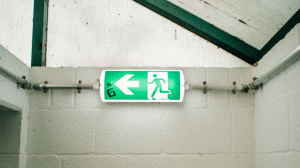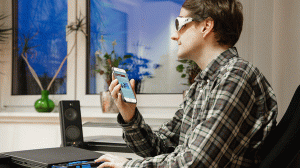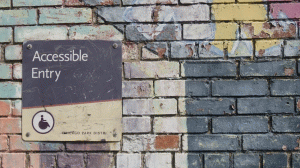What place does menstruation have in the workplace? How can companies design a period-friendly work environment? How can people use cycle awareness as a super power in their work and daily lives? In this interview, Britta Wiebe, Co-Founder of Vulvani, answers these questions and shares her vision for creating a digital one-stop shop for female health that demystifies knowledge about the female body, breaks taboos and empowers future generations of womxn.
What was your motivation for starting Vulvani? Was there a certain moment or experience that served as an ah-ha moment?
Even as an educated cis woman, I have only become more aware of my own menstruation in my mid-twenties. This was due to longer stays abroad in Central America, where access to menstrual products was not always guaranteed. When I first learned about Free Bleeding during this time, I was hooked. I started endlessly researching about periods, the menstrual cycle and everything that comes with it. Through this and many conversations I realized the lack of knowledge about the female body. This sparked a desire in me to make a difference and raise awareness about education about supposedly taboo topics: menstruation, cycle health and sexuality.
Vulvani emerged as a passion project during a six-month trip through South America in early 2020 and my co-founder Jamin and I successfully developed it into a social impact startup. We believe in making this world a better place by making the menstrual cycle the center of our work.

Tell us about your work. What’s been your social impact to date?
Two billion womxn worldwide know the feeling of being overwhelmed and helpless due to knowledge gaps along the 50-year journey with their uterus, e.g. challenges with fertility, menstruation or menopause. In a world where the female body is treated as a taboo, there is lack of education, research and acceptance.
This is exactly where we come in. We talk about topics that others prefer to keep quiet about and empower womxn to make confident decisions about their body. We are demystifying knowledge about the female body and making it accessible, so that future generations do not have to grow up with the same stigmas and feelings of helplessness. We ensure that taboos are broken and knowledge gaps are closed - for a more just world. Our biggest motivation every day is to help womxn feel good in their body.
Vulvani will be the world's first digital one-stop shop for female health with an integrated user journey of an e-learning and e-commerce marketplace. We are creating a safe online space for empowered education, independent learning and often unspeakable questions.
You offer an online course on cycle awareness as a super power - can you explain the concept behind this? If there are learning or takeaway from the course what people are consistently surprised about?
In our online course “Cycle awareness as a superpower” we’re teaching how to live more creatively, happily and productively through more knowledge about the menstrual cycle. We designed the online course as a toolbox and guide to help the participants learn more about the specifics of the menstrual cycle and feel good in their bodies. Understanding the different phases of the cycle is a special way to approach our own health, well-being, productivity, creativity or even fertility – and that’s exactly what we want to share through this online course. Because we can tell you one thing: It’s better to live in harmony with your own body than to constantly fight against it.
The biggest learning from the course is that it’s ok to not feel the same every day of the month. And I think this feedback from one of our users sums up their learning perfectly: "I have never understood myself as well as I have since I started tracking my menstrual cycle and period. I am truly grateful for all the knowledge this course has brought into my life!"
In your opinion, what place does menstruation have in the workplace? For many companies, talking about periods is still taboo. What can be done to remedy/counter this?
Recognizing the needs of menstruating people is key and an inclusive corporate culture for all employees must be designed in a way that different needs are equally supported. If the workplace ensures safe and healthy working conditions for all, this should also include guidelines to break the period taboo at work.
Here are four tips for designing a period-friendly work environment:
1. Period education for all
In order to fight the period taboo, it is important to improve the knowledge about menstrual health in the company. A workshop could be a start.
2. Cycle awareness as superpower
Even though the menstrual cycle is a key process in our body, the understanding of it is very often limited. To incorporate the menstrual cycle as a tool and cycle-oriented work as a method into the business world is a revolutionary approach!
3. Menstrual goodies
When restrooms are equipped with free period products, hot water bottles, painkillers or herbal teas would be a great addition to help with menstrual discomfort.
4. Cycle flexibility
Say hello to remote work and flexitime! The possibility of setting your own hours working to rest, e.g. when menstrual problems are more severe or work overtime around ovulation, can significantly improve the (work) life of a menstruating person.
How can people adopt a cycle-based approach to their work and professional endeavors? How might this look like reality?
The menstrual cycle is an important part of many employees and these experiences and therefore it’s important to develop a strategy that does not perceive menstruation as a burden, but accepts it as a natural body process and strength. If we bleed, we are not sick. On the contrary, it is a sign of our health! Here are a few simple steps towards a cycle-based approach to work:
1. Tracking
Start tracking your cycle because cycle awareness is based on observing your menstrual cycle. Here are a few questions that are great to ask yourself daily: On which day am I in my menstrual cycle? What comes easy for me today at work? What feels more difficult?
2. Analyzing
If you start taking daily notes, you’ll notice patterns in your cycles. Think about what kind of your work and tasks fit best with which cycle phase. Here are some examples as inspiration: Research during menstruation? Brainstorming new projects during the follicular phase? Meetings around ovulation? Critical analysis during the luteal phase?
3. Planning
Mark the different cycle phases in your calendar to remind you what kind of work would be best for you. Use the information from your cycle tracking to adjust your work schedules, whenever possible.
What next for you, Vulvani - and menstruation?
Sooo much is happening right now in the menstrual space and it’s exciting to be part of this movement. We believe in building Vulvani by working together with others and not alone. Better together is our motto. That’s why we’re currently working on creating an educational marketplace around female health. In addition to our own online courses, we’ll be offering online courses by other female health experts as well. We’re also currently in our first financing round, which is a crazy journey.










